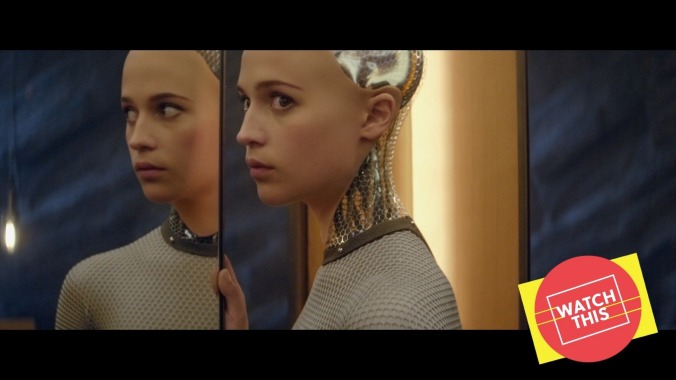Alicia Vikander deserved her Oscar for Ex Machina, not The Danish Girl

Watch This offers movie recommendations inspired by new releases, premieres, current events, or occasionally just our own inscrutable whims. This week: The Academy Awards are Sunday, so we’re looking back on times when an actor was nominated for the wrong film—and on the performances they should have been nominated for the same year.
Ex Machina (2015)
It’s no secret that science fiction stands with horror and comedy among genres afforded the least amount of respect by the Academy of Motion Picture Arts and Sciences. Hell, it may be the least-respected, full stop; The Silence Of the Lambs and Shakespeare In Love both won Best Picture, at least. So it’s not surprising that faced with a choice between a faux-relevant costume drama and a movie about robots, the Academy opted to honor Alicia Vikander’s work in the former, rather than the latter. It is enervating, however, that the costume drama in question was The Danish Girl, a movie that will only ever be watched in future college courses about the indignities suffered by trans characters in cinema. For her co-lead role opposite Eddie Redmayne, Vikander received a Best Supporting Actress Oscar. It was her you-had-a-good-year trophy for 2015.
Vikander is also arguably a co-lead in Ex Machina, a sparsely cast movie that barely has any supporting performances. (Sonoya Mizuno—known from GIFs as Oscar Isaac’s robot dance partner—does some under-recognized work in that category.) Nevertheless, it would have been easy enough to swap Vikander’s performance as Ava, an artificial intelligence created by tech CEO Nathan (Isaac) and tested by programmer Caleb (Domhnall Gleeson), into the Best Supporting Actress category that year. Though the movie is about figuring out how human Ava really is, she doesn’t have a lot of screentime. Most of Ex Machina unfolds from Caleb’s point of view, as he’s summoned to Nathan’s compound to meet and interact with this new technological breakthrough. While he conducts a series of “sessions” with Ava, she spends much of the movie on the periphery, a woman-shaped mystery trapped behind glass.
This part’s degree of difficulty is substantial, and Vikander passes the test: She makes Ava plausibly robotic, with even tones and a measured, placid expression in her early scenes, then convincingly human as she reveals some emotion and a possible capacity for manipulation. Caleb is tasked with Turing-testing her via interviews, and as the movie goes on, Vikander silently signals how misguided this technique may be. Whatever degree to which Ava contains “real” humanity, it’s ultimately more visible on her face than in her dialogue. Unlike Vikander’s character in The Danish Girl, she doesn’t have many opportunities to speechify about her feelings.
Where Ex Machina did score an Oscar nomination, and a win, is visual effects. (Due credit to the Academy here: These effects are some of the smallest-scale offerings they’ve ever awarded.) Perhaps this quietly stunning work diminished Vikander’s performance in voters’ eyes, creating the impression that they were watching a mostly computer-generated creation, and a performance more accurately attributed to animators. Like Caleb, they might have been performing the wrong kind of test; the physicality of the performance still came from Vikander, with animators replacing parts of her body (and imitating their movement) in post-production. When Ava dons a floral dress and a wig, covering up the transparent casing that showcases some of her robotic innards, Vikander looks superficially more human, while still moving with a semi-mechanical delicacy. She creates continuity between these different versions of her body, blending the effects work into her performance.
A later scene where Ava essentially shops for clothes and skin from discarded robots captures her from multiple angles at once via Garland’s beloved mirror motif, and the exposure of that moment has surprising tenderness without getting sloppily sentimental. Again, there’s no Oscar-friendly statement of want or need. Those desires are on Vikander’s face—and both the actress and her director realize that there’s value in keeping some of these things concealed, that effective and arresting performances need not be so demonstrative. Vikander is the female lead of Ex Machina, but awarding her in the Supporting Actress category still could’ve fit; good as her co-stars and director are, she’s a support beam for a lot of weighty but familiar sci-fi ideas.
Availability: Ex Machina is currently streaming on Showtime and Kanopy. It’s also available to rent or purchase digitally from Amazon, Google Play, Apple, YouTube, Fandango Now, Redbox, DirecTV, and VUDU.